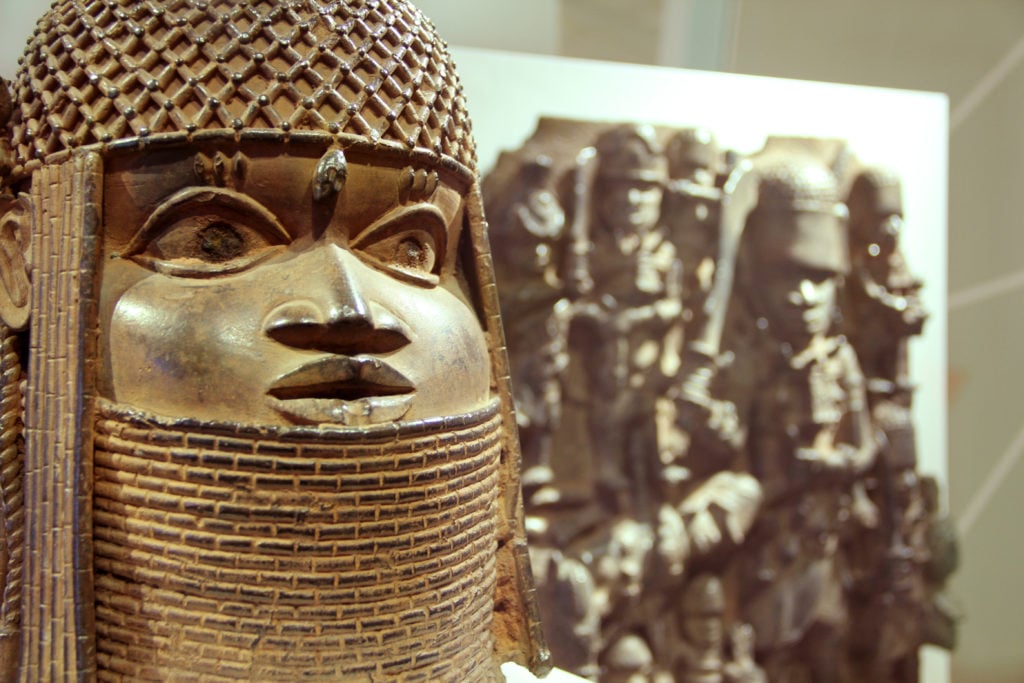Law & Politics
Nigeria Has Transferred Ownership of the Benin Bronzes to Its Royal Leader, Creating a ‘Better Environment’ for Future Restitution
The ruler, Oba Ewuare II, will be responsible for managing where the sculptures are housed.

The ruler, Oba Ewuare II, will be responsible for managing where the sculptures are housed.

Vivienne Chow

The restitution of Benin bronzes by European institutions may now have a clearer pathway as the Nigerian government has officially recognized the artifacts as belonging to the traditional king, Oba Ewuare II, rather than to the state or anyone else.
“This recognition will definitely make the repatriation of the bronzes to the Edo State easier, as it removes a well-known argument against repatriation to modern-day Nigeria,” Laurens Kasteleijn, founder of the Amsterdam-based consultancy Art Law Services, told Artnet News.
“Now that the Oba shall be responsible for the management of all places where the repatriated artifacts are domiciled or located, it creates a better environment for restitution,” Kasteleijn continued, adding that this can better protect the artifacts from becoming subject to corruption in the country.
It first emerged as a controversy last fall when the Benin chiefs argued that the artifacts belonged to the Oba and no one else. And it would be up to the Oba to decide the permanent home of the artifacts that were looted from the royal palace of the former Kingdom of Benin by British troops in 1897. Some senior chiefs told The Telegraph in November that the works should be returned to the palace, as they were taken away from the palace.
Initially, there were debates between the Nigerian government and the Benin chiefs but on March 23, the Nigerian federal government has gazetted its view, officially recognizing the the Oba of Benin as the rightful owner and custodian of all Benin artifacts that were stolen from the country, ending a tussle between the Oba and the Edo state government Godwin Obaseki.
“Repatriated artifacts may be kept within the Palace of the Oba or such other locations within Benin City, or other place that the Oba and the Federal Government of Nigeria may consider secure and safe,” the gazette read.
Some have argued that the latest development may cast doubt over the ongoing restitution process as European museums and institutions have been negotiating the deals with the National Commission for Museums and Monuments (NCMM) of the Nigerian government. And the repatriated works are expected to be exhibited in the Edo Museum of West African Art in Benin City, a new venue slated to open in 2026.
“They are now asking, who is our partner? It also blindsided the NCMM,” Barnaby Phillips, author of Loot: Britain and the Benin Bronzes, told The Art Newspaper.
The looted Benin bronzes are scattered across different institutions around the world; 928 of them are housed at the British Museum in London, the largest trove of these artifacts. Certain countries including France, Belgium, the Netherlands, the U.K., and Germany have already begun repatriating Benin bronzes to Nigeria. Germany last year signed a memorandum with the Nigerian government on the transfer of ownership of over 1,000 artifacts.
The University of Aberdeen in the U.K. returned its Benin bronze, depicting the head of an Oba, to representatives of the Oba, NCMM, and the Nigerian Commission in Aberdeen in October 2021. “It was then given to the Oba by representatives of NCMM and the federal government in a ceremony in the Oba’s palace on February 13, 2022,” a university spokesperson said in a statement to Artnet News. “As it was a matter of returning stolen property, this was done without conditions about its future treatment or display.”
The Horniman Museum in London also shared a similar response, saying that the transfer of ownership of 72 Benin artifacts was agreed last year with the NCMM in response to the NCMM’s formal request. “This transfer of ownership was unconditional so any decision to transfer ownership onwards is a matter for the Nigerian government,” a museum spokesperson told Artnet News.
Six objects were returned to NCMM in November, but the museum has no information about their current status. Sixty-six objects are still with the Horniman Museum but no further plans to physically return the works to Nigeria at the moment, the spokesperson added.
Artnet News has also reached out to the Rautenstrauch-Joest-Museum in Cologne, which restituted the artifacts to Nigeria, for comment.